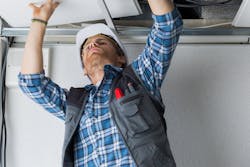How do you become a licensed master electrician? You would think this simple question would have a straightforward answer, but that’s not always the case. The process tends to have several grey areas, depending on the path you take and the jurisdiction you seek to get licensed in. Here are the determining factors:
- Did you attend a trade school program, state-registered apprenticeship program, or are you self-taught?
- Do you have four to six years of verifiable field experience (pay stubs or W-2s)?
- Did you work consistently as an electrician under the direct supervision of a master electrician? Will any of these electricians vouch for your experience?
- Does the jurisdiction you want to work in have a local county license or a statewide license?
If you meet all of these requirements, you may be required to pass an examination; some exams are tier-based (e.g., limited license residential) or a master level exam (commercial and industrial).
Unlike other occupations, it typically takes four to six years to become a licensed “master” electrician. In large metropolitan areas ("First Class") — major cities (less than one million residents but over 300,000 people) like Philadelphia — you are required to take a five-hour exam and meet all of the above qualifications. Pennsylvania does not have a statewide license, so electricians have to get licensed in every jurisdiction in which they perform electrical services. Adjoining states, such as Delaware, New Jersey, and Maryland have statewide licenses, so requirements may differ from other jurisdictions. New Jersey requires electricians to take a three-part exam: the (NEC) National Electrical Code portion, New Jersey Business Law, and a fire alarm code portion. In addition, licenses issued by a state typically require applicants to have completed a state-registered apprenticeship program.
The requirements vary from state to state and city to city. Make sure you gather this information on your own; don't rely on hearsay. Seek out testing preparation courses that can give you straight answers, visit the township, state, or county office in person, be prepared, and have a list of questions ready. All of this information is free; don't be bashful.
There are exceptions to some of these licensing requirements. For example, electricians can also be granted an electrical license through a process called "reciprocity." This is an agreement between two or more states or local jurisdictions. To become licensed in a reciprocal state or jurisdiction, you only have to pass the reciprocal jurisdiction’s exam if you wish to practice in the other area; they waive the testing requirements if you have been granted a license through their mutual area agreement (e.g., electricians licensed in Allentown, Pa., can be issued a Bethlehem, Pa. license or the State of Connecticut through reciprocity; licensed electricians in Philadelphia can be issued a license in Harrisburg and Pittsburg, without re-testing).
In addition, small cities or towns with a population less than 300,00 but at least 25,000 located outside a metropolitan area may have less stringent requirements. In fact, some of these jurisdictions have no testing requirements at all. Smaller jurisdictions may issue an electrical license with just proof of commercial liability insurance and the appropriate permit fees paid. Smaller jurisdictions typically have reciprocity agreements with their adjoining neighbors, so it’s easier to navigate the licensing requirements.
Before you set off to take any licensing exam or pursue establishing an electrical contracting firm, you should have a basic understanding of a few things first:
- Basic electrical theory
- National Electrical Code (NEC) navigation
- Basic accounting
- Local and federal tax laws
- Workman's compensation insurance
- Types of business entities (sole proprietor vs. incorporating)
Although some of these subjects may seem quite daunting, invest the time to educate yourselves on them. If you do; you'll reap the rewards handsomely. Remember, no one in our industry has every subject mastered; electricity is just too broad. So take your time, learn the business, and success will come slowly. My advice is take the steps, not the elevator. And if you ever need help figuring things out, feel free to shoot me an email.
De Loach, a master electrician and electrical trainer/instructor, is the founder of The Academy of Industrial Arts (www.taia-school.com) in Philadelphia. With more than 30 years of experience in the field, he will be writing regular exclusive content for E-Train and can be reached at [email protected].
About the Author
Harold De Loach
De Loach is the Director of Education and Training for the Leaders of Electrical License Preparation courses for Philadelphia and The Lehigh Valley (www.necprepclass.com). He is the founder and Director of The Academy of Industrial Arts L.L.C. (www.taia-school.com), a customized electrician training program that provides entry-level electrician training courses, electrical safety classes and customized electrical construction courses. He is trained by the National Center for Construction Education and Research (NCCER). He is a member of The National Society of Collegiate Scholars, the Independent Association of Electrical Inspectors, the Electrical Association of Philadelphia, and the Better Business Bureau.
His level of knowledge affords him to teach entry, intermediate, and master level electricians. Armed with more than 20 years of experience in the electrical, general construction, and real estate development industry, he offers his students and clients several unique skill sets. He has worked as the Head Craft Instructor and Assistant Director of Education at the Apprenticeship Training Center (affectionately known as The ABC School) in Harleysville Pennsylvania for Associated Builders and Contractors (The South-Eastern Pa. Chapter). Prior to Joining ABC, he directed a work-readiness (Re-Entry) Construction Technology program within The Philadelphia Prison System and as an Electrical Technician Program instructor at Kaplan Career Institute (Formerly Thompson institute) in Center City Philadelphia and Franklin Mills. He is available for consultation, private tutoring, speaking engagements, or strategic partnerships that can bolster the number of new electricians entering the industry.

